Hand of Fate: Ordeals — Deadly dealings
Hand of Fate: Ordeals is the recently released board game about a video game about a card game. We followed the Kickstarter closely back in 2017 and we’ve recently managed to get our hands on a retail copy.
Hand of Fate: Ordeals wisely treads close to the core subject matter, offering players of the video game familiar iconography, imagery and characters. As such, everything you see within the game — including the box art itself — feels very authentic, making Ordeals a real labour of love. This closeness to the source material might be enough for some people, but I was curious to find out how Hand of Fate: Ordeals’ combat translated into a traditional board game.
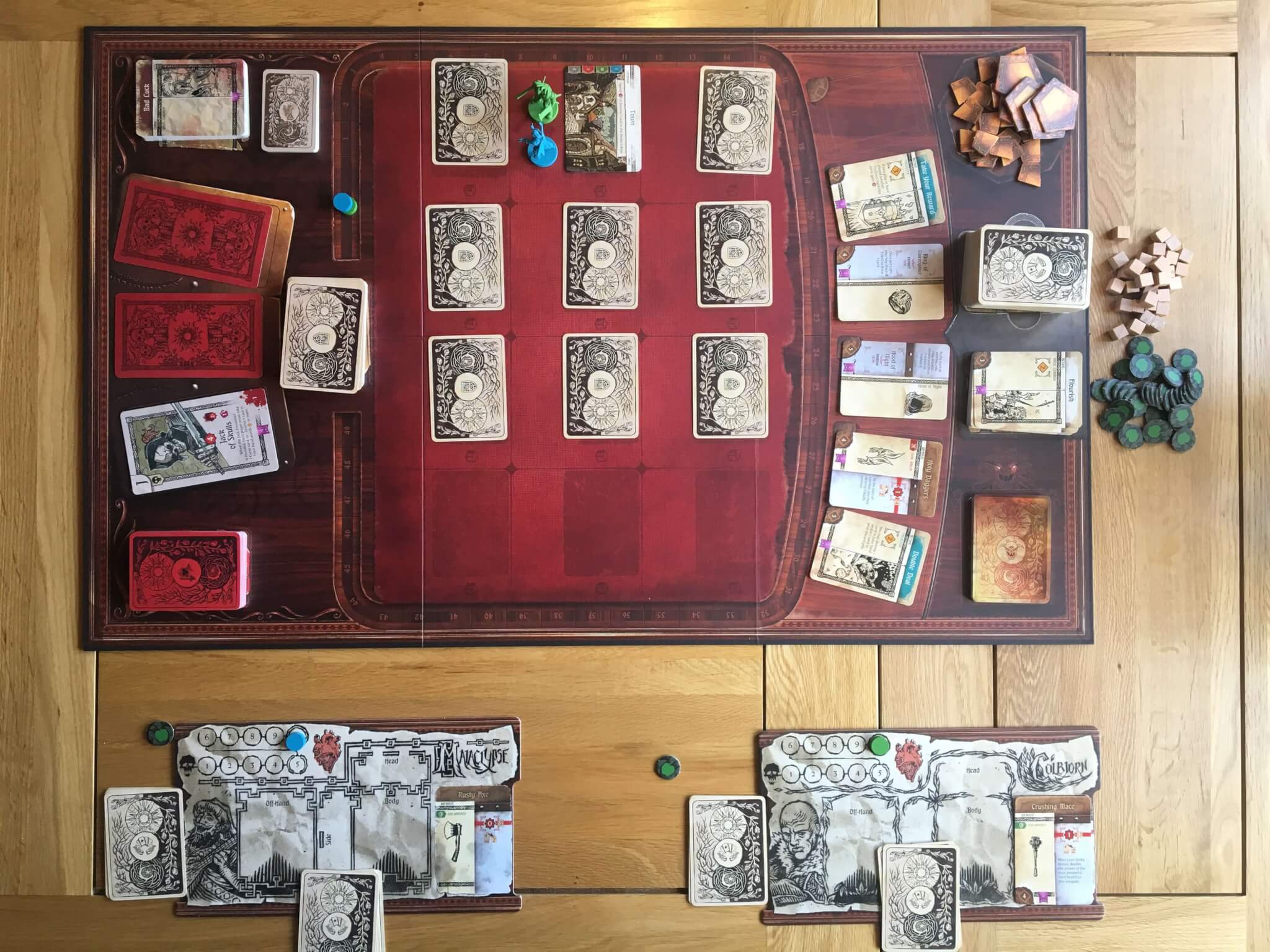
Before I go into detail though, let me just dwell on the construction quality in Hand of Fate: Ordeals. This is a big box game that is packed with big, bold and beautiful things. The board is unusually large, folding out onto the table across six leaves. On it, there are oversized spaces for location cards, the dealer deck and numerous other ancillary elements and much of the space is unused from a gameplay perspective, but serves to create a sense of theme.
The card backs (of which there are many) can occasionally confuse at first, with various different sets of items, events, locations and so on all looking fairly similar to the untrained eye. Once you get to know them setup will become second nature. Each player chooses a miniature and a player board, then takes a set of starting cards to begin the game. After that, it’s a simple case of drawing some dealer cards, placing a few locations and diving in.
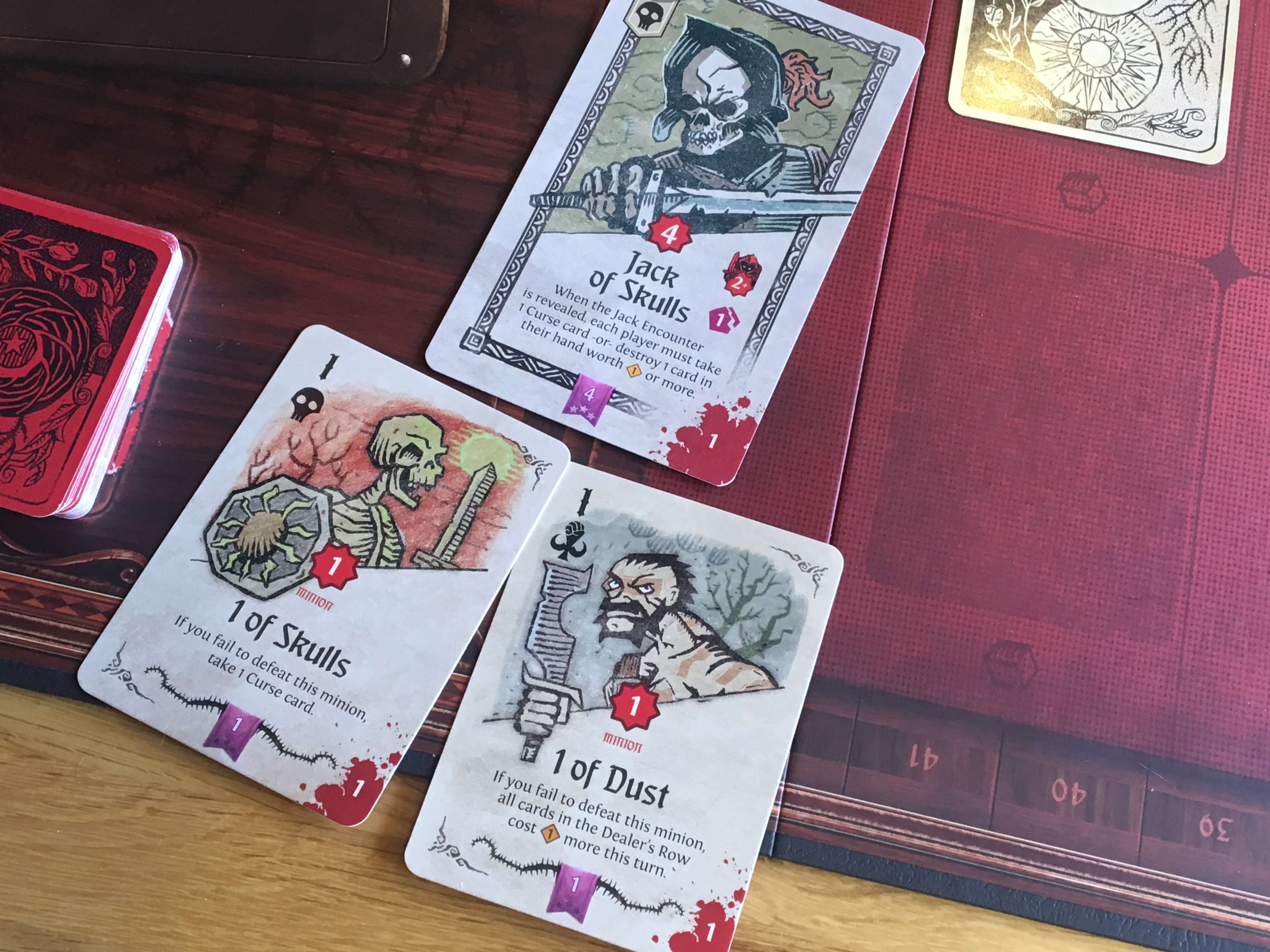
Hand of Fate: Ordeals is essentially a deck building game with some elements of exploration and combat thrown into the mix. There are various ways to play including cooperative, competitive and solo, but each has a basic structure to follow. The players will work their way through three levels of enemies (beginning with level one) facing down an end of level boss for each. In the base game, these enemies are from a set referred to as “Royalty” and include the Jack, Queen and King of various suits, such as Skulls or Dust.
As you can probably imagine, the players will each need to expand their deck to include new and powerful cards before they engage the current Royalty card or even some of the more powerful minions. To do this, the players will explore the locations (which begin face down) by spending their food tokens and purchase new cards from the dealer market by spending Effort. More actions become available as new cards are added, but exploring the map and purchasing new cards are the staples.
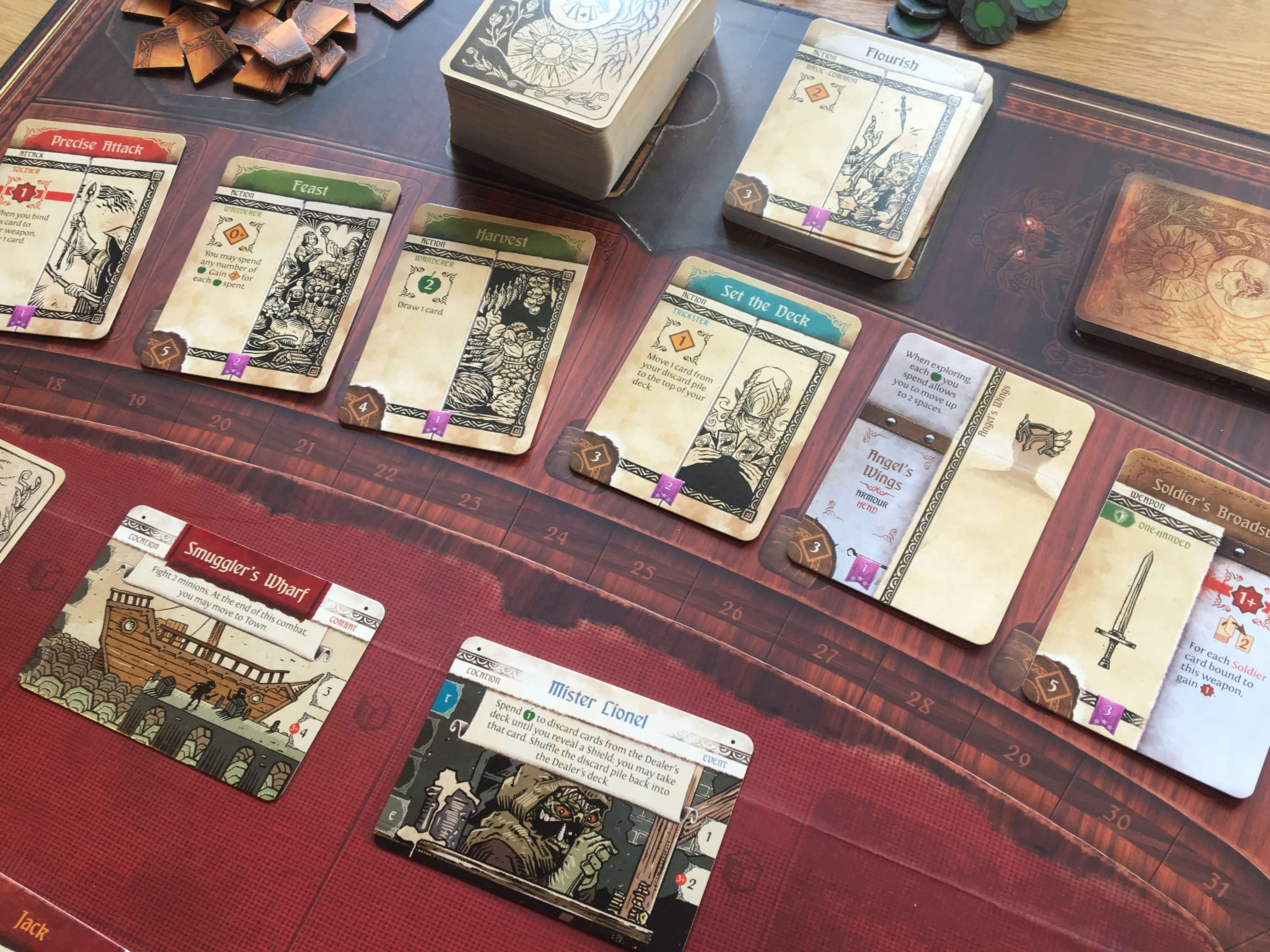
At the most basic level, each deck contains cards that generate one or more of the three basic symbols; Food, Effort and Power. The starting deck mostly comprises of Effort cards (seven) with two Forage cards and only a single offensive card, called Hack. Five cards are drawn at the beginning of the game, and as players use them, they will create a personal discard which is the reshuffled when the draw deck runs out. As is almost always the case in deck building games, new cards go directly to the discard pile.
Early turns in Hand of Fate: Ordeals are almost always based on tentatively building out the player decks without much venturing forth. In my very first game, I recall exploring before I did anything else (in the hopes that I would discover a nice bonus) and I met The Jack of Skulls, who attacked and defeated me immediately. This kind of slightly unforgiving randomness is present in many places across this game, but in general, it’s something you will get used to with experience.
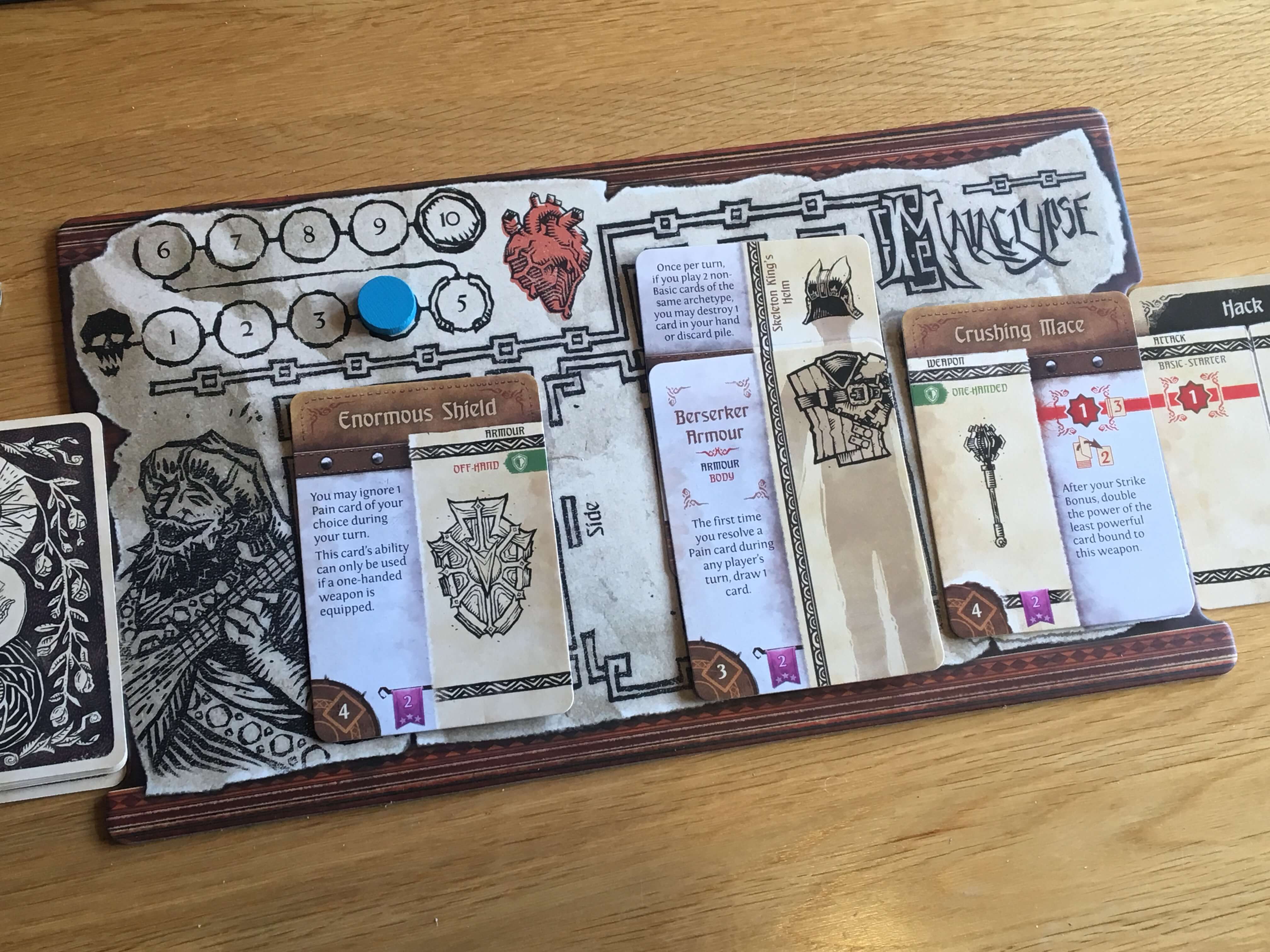
The basic loop in Hand of Fate: Ordeals then is to spend a number of cards that generate Effort in order to buy new skills, armour, weapons and other helpful objects. Items and equippable cards act differently to skills in that they don’t go into your hand but instead, they are placed onto the player board. Each character can have a weapon (or item like a shield) in each hand, and can then take a helmet as well as body and leg armour. Each armour card is designed in a certain way so that it overlaps the others, but allows all effects to remain visible — this is a neat looking feature that I love.
With the relatively slow first three or four turns out of the way, the players will begin to explore the world of Hand of Fate: Ordeals, leading to fights with enemy minions and various encounters which can yield good or bad outcomes. Combat is unusual but relatively simple and it requires players to link their Power generating cards to their weapons based on how many cards each can sustain. Then players spend Effort in each round of combat to avoid becoming exhausted.
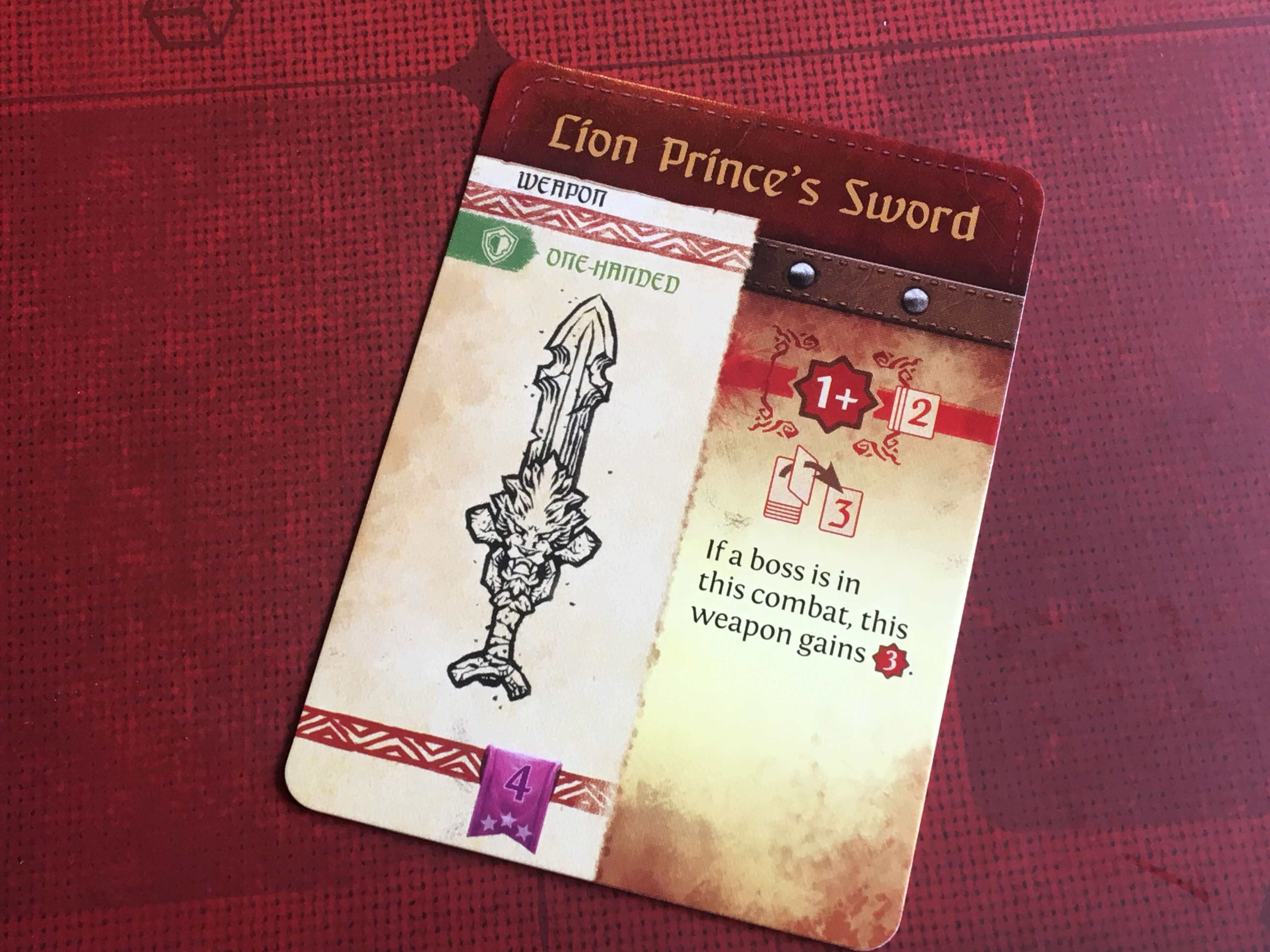
This isn’t something I’ve seen in a game before, but what it results in is a measured approach to both deck-building and combat. Players must carefully balance their Power and Effort building cards and consider what is in their hand, deck and discard before engaging in combat. It’s also not practical to have a lot of Power cards if you don’t have a weapon that can sustain them. For example, most basic weapons can only take two Power cards onto them.
The randomness and overall difficulty level make Hand of Fate: Ordeals a bit of a challenge for players new to deck-building, but the relatively high level of finesse offered by the cards, the armour/item system and the combat mechanism feel rewarding as you invest more time into them. There are numerous location and Royalty cards to work through, meaning that the game is never the same twice and if you do enjoy it enough to play it to exhaustion, then various expansions are already available.

Overall, Hand of Fate: Ordeals is a very well produced, attractive and quite unique deck builder that captures the essence of the video game visually and in most areas that it represents. It’s a tough game for new players, but a rewarding one for those who stick with it. The ability to expand it further is present and there are relatively few other games like it. All in all, a strong recommendation if you’re a fan of the video game or of moderately complex deck building games in general.
Hand of Fate: Ordeals is available now, you can find out more about it on its website.

Comments are closed.